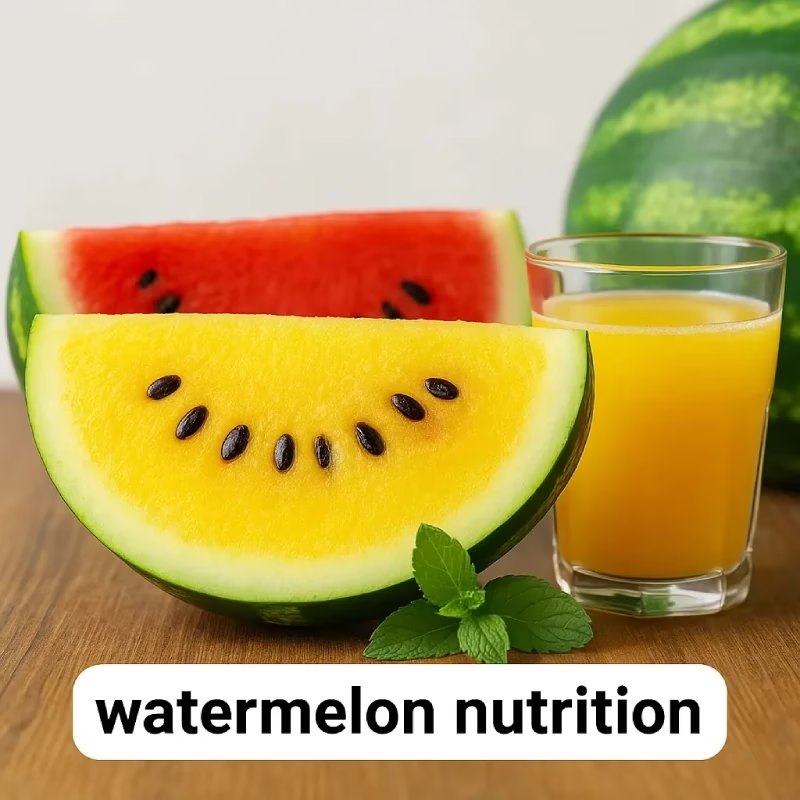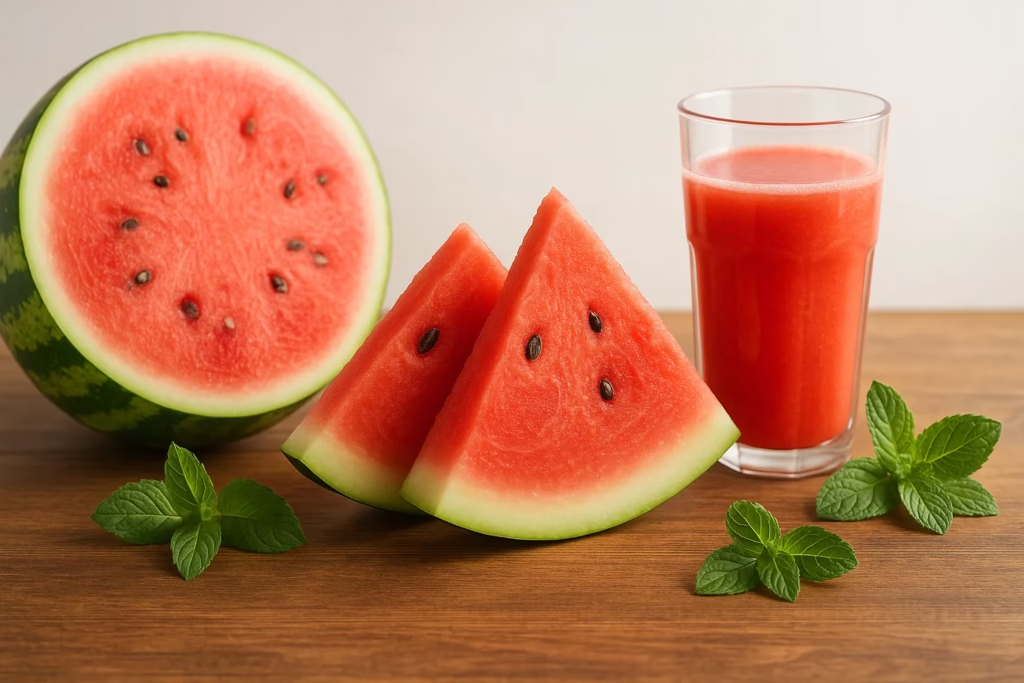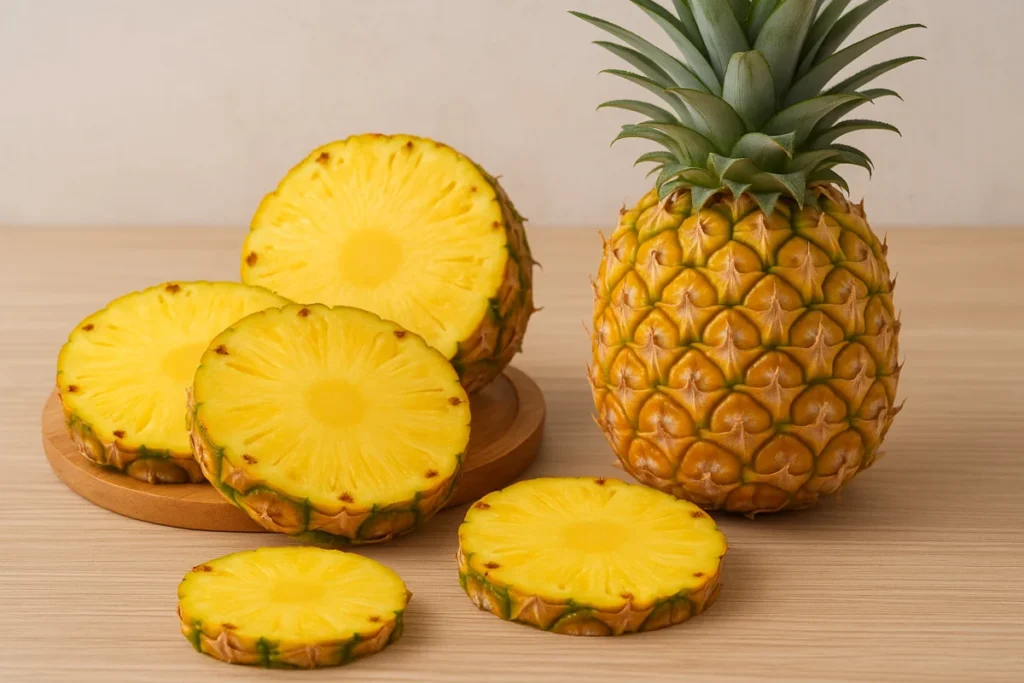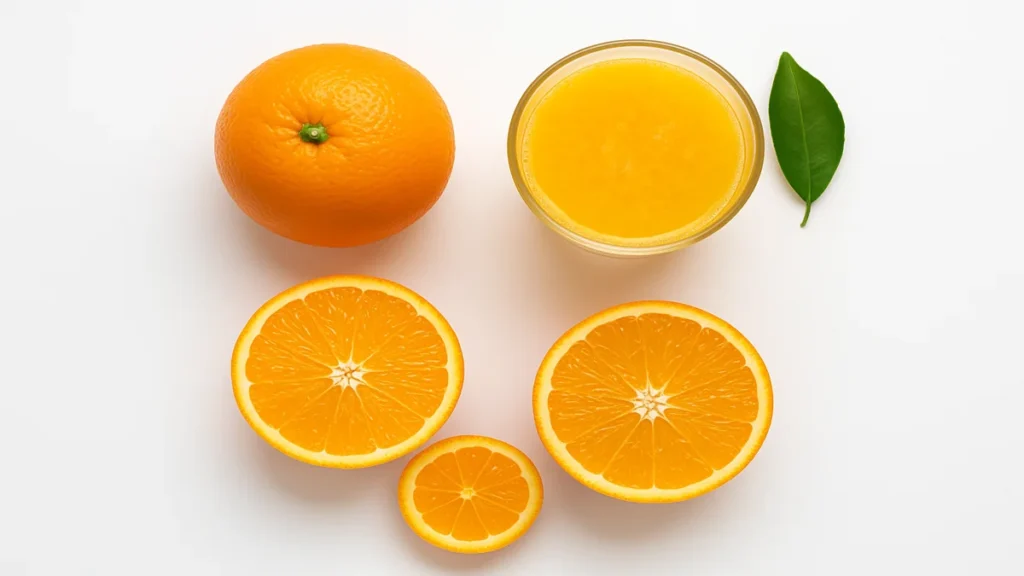Discover the watermelon nutrition advantage: calories, vitamins, and hydration benefits. Learn why this summer fruit is more than just sweet refreshment.
Table of Contents
Introduction
When people think of summer fruits, watermelon instantly comes to mind. But beyond its juicy sweetness, watermelon nutrition offers a real advantage to your health. From vitamins and antioxidants to hydration support, watermelon is more than a seasonal treat; it’s a nutrient-packed fruit loved in the US, UK, Mediterranean, and Asia.
Why Watermelon Nutrition Matters
Watermelon is about 92% water, making it one of the best foods for hydration. It also contains essential nutrients like vitamin C, vitamin A, potassium, and magnesium, all while being naturally low in calories. This combination gives watermelon a unique advantage in modern diets, whether for athletes, weight-watchers, or families.
Watermelon Nutrition Facts (Per 100g and 1 Cup)
| Nutrient | Per 100g | Per 1 Cup (152g) |
|---|---|---|
| Calories | 30 | 46 |
| Water | 92g | 139g |
| Carbohydrates | 7.6g | 11.6g |
| Sugar | 6.2g | 9.4g |
| Fiber | 0.4g | 0.6g |
| Vitamin C | 8.1mg (9%) | 12.5mg (14%) |
| Vitamin A | 28µg (3%) | 43µg (5%) |
| Potassium | 112mg | 170mg |
| Magnesium | 10mg | 15mg |
*%DV values are approximate and may vary depending on source and serving size.
Key Health Benefits of Watermelon
Hydration and Electrolyte Balance
Because it’s mostly water, watermelon is one of the best fruits to prevent dehydration. Athletes often use watermelon juice nutrition as a natural electrolyte drink.
Rich in Vitamins and Antioxidants
Packed with vitamin C, beta-carotene, and lycopene, watermelon may support immunity and skin health. Research links lycopene to heart health, giving another nutritional advantage.
Low in Calories, High in Advantage
With only 46 calories per cup, watermelon is weight-friendly. This makes it a great late-night snack compared to higher-calorie desserts (USDA SNAP-Ed).
Fiber for Digestion
Although small, watermelon’s fiber content supports digestion and satiety. Eating watermelon rind also provides extra nutrients and fiber.
Regional Popularity and Culinary Uses
- United States and UK: Popular in summer picnics, barbecues, and fruit salads.
- Mediterranean Countries: Served with cheese like feta for a salty-sweet balance.
- Asia (Japan, China): Used in cold desserts, smoothies, and sometimes pickled rind.
Refreshing Watermelon Juice Recipe
Ingredients
- 2 cups seedless watermelon (chilled)
- 1 tsp lime juice
- A few mint leaves
Instructions
Serve over ice for a refreshing drink.
Blend watermelon cubes until smooth.
Add lime juice and mint.
Bitebene Insight
Eating yellow watermelon offers a sweeter taste and more beta-carotene compared to red varieties. Try both for maximum advantage!

Got Questions About Watermelon Nutrition? We’ve Got Answers
1. How many calories and nutrients are in 100 g of watermelon?
A 100g serving of watermelon contains about 30 calories, 92g of water, 8mg of vitamin C (13% DV), and 112mg of potassium (3% DV). It also offers trace amounts of magnesium, vitamin A, and lycopene, an antioxidant linked to heart health.
2. Does blending watermelon destroy its nutritional value?
No. Blending watermelon retains most of its vitamins, antioxidants, and hydration benefits. However, if you strain the pulp, you may lose some fiber, which helps with digestion and satiety.
3. Is seedless watermelon less nutritious than seeded varieties?
Not really. Seedless watermelon has nearly the same calorie count, water content, and vitamin profile as seeded watermelon. Both are excellent sources of hydration and vitamin C.
4. What’s special about yellow watermelon nutrition?
Yellow watermelon is rich in beta-carotene, the pigment that gives it its golden color. Beta-carotene is a powerful antioxidant that supports eye health and skin radiance and may help reduce inflammation.
5. How many calories are in half a watermelon?
A medium-sized half of a watermelon (~2.5 kg) contains approximately 750–800 calories. Despite being high in water, it still adds up if consumed in large quantities, especially with sweetened drinks or desserts.
6. Is watermelon good for weight loss?
Absolutely. Watermelon is low in calories, high in water, and contains natural sugars that satisfy sweet cravings. It can help you feel full with fewer calories, making it a great snack for weight management.
7. Does watermelon juice have the same benefits as fresh watermelon?
Almost. Watermelon juice retains most of the vitamins, minerals, and antioxidants, but the fiber is lost if the pulp is removed. For better satiety and gut health, include the pulp or eat it whole.
8. Is it okay to eat watermelon at night?
Yes, in moderation. Watermelon is hydrating and light, making it a better late-night snack than heavy sweets. However, its natural sugar content may not suit everyone before bedtime—especially for people with blood sugar concerns.
9. Does watermelon spike blood sugar levels?
While watermelon has a high glycemic index, it has a low glycemic load, meaning it doesn’t cause a large spike in blood sugar when eaten in normal portions. It’s generally safe for most people, including those with diabetes, in moderation.
10. Is watermelon safe to eat every day?
Yes. Eating watermelon daily can support hydration, digestion, heart health, and even exercise recovery thanks to its potassium and citrulline content. Just be mindful of portion size if you’re watching sugar intake.
11. What’s the difference between red and yellow watermelon?
Red watermelon is high in lycopene, a heart-friendly antioxidant, while yellow watermelon is richer in beta-carotene, which supports vision and immune health. Both offer great hydration and nutrition, just with slightly different health perks.
12. Can watermelon help with muscle recovery after exercise?
Yes. Watermelon contains citrulline, an amino acid that may help reduce muscle soreness and improve blood flow. Drinking watermelon juice after workouts can be a natural recovery drink, especially in hot weather.
Quick Recap
Watermelon is more than a summer snack; it’s a nutritional powerhouse. From hydration to vitamins and fiber, the advantage of eating watermelon regularly is clear. Whether you enjoy it fresh, juiced, or in recipes, watermelon nutrition is a sweet way to support health.
Related Reads on Bitebene
➡️ Read More: Benefits of Bananas
➡️ Read More: Benefits of Orange



